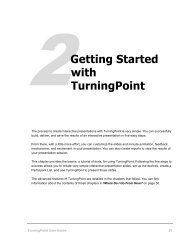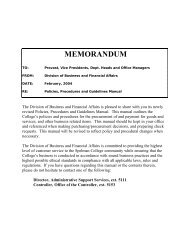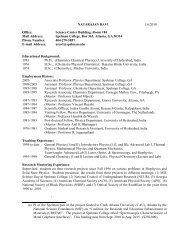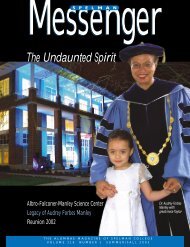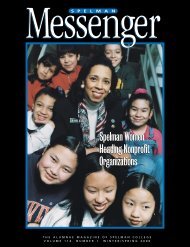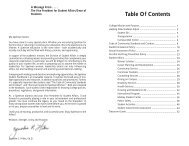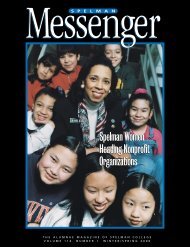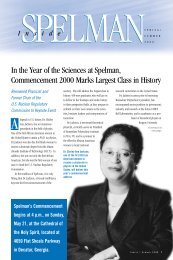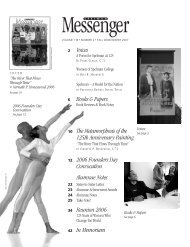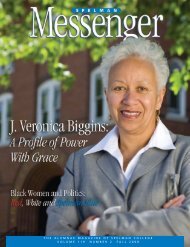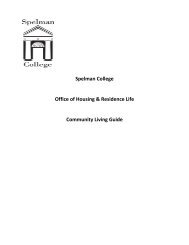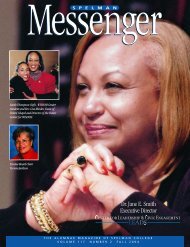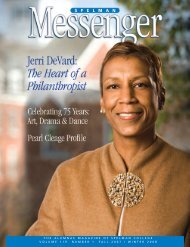Winter 2006 (PDF - Spelman College
Winter 2006 (PDF - Spelman College
Winter 2006 (PDF - Spelman College
Create successful ePaper yourself
Turn your PDF publications into a flip-book with our unique Google optimized e-Paper software.
Hip Hop Week at <strong>Spelman</strong> <strong>College</strong><br />
A Critical Analysis and Celebration of the Culture<br />
S<br />
pelman <strong>College</strong> and hip hop pioneer<br />
MC Lyte joined forces, October 31 –<br />
November 4, 2005, to host a series of<br />
events focused on women and hip hop, and the<br />
impact this popular culture is having on youth<br />
in urban, suburban, rural and global communities.<br />
The weeklong series included panel discussions,<br />
guest lectures, events organized by the<br />
student organizations SisterFire and The Hip<br />
Hop Collective, a conversation between Cosby<br />
Endowed Professor Pearl Cleage and hip hop<br />
pioneer MC Lyte, a surprise performance by<br />
musical artist India.Arie and an impromptu<br />
performance demonstrating the finer points of<br />
rapping by MC Lyte.<br />
During the conversation between Pearl<br />
Cleage and MC Lyte, author/playwright/feminist/<br />
activist Cleage asked MC Lyte about the role race<br />
plays in relation to the images and messages<br />
that are popular in hip hop today. “White kids<br />
in the suburbs are making hip hop popular . . .<br />
being one of its largest consumer groups,”<br />
explained Lyte. “Young white consumers are<br />
making these artists popular and getting them<br />
on the cover of national magazines.” In addition,<br />
Lyte opined that young women “are not<br />
During Hip Hop week at <strong>Spelman</strong> <strong>College</strong>, an evening of conversation occurred between Cosby<br />
Endowed Professor Pearl Cleage (left) and hip hop pioneer MC Lyte.<br />
quite sure what behavior is acceptable from<br />
young men, and they’re getting their answers<br />
from hip hop music and videos.”<br />
Cleage asked what special role students of<br />
historically Black colleges and universities can<br />
play in countering the negative images that are<br />
popularized in some hip hop music and videos.<br />
Lyte responded, “They can get involved with<br />
elementary and middle school students and<br />
offer them their knowledge. They can give the<br />
kids something to look up to by getting involved<br />
in the community.”<br />
The week of activities was especially meaningful<br />
in the wake of the October 12, 2005,<br />
passing of C. Delores Tucker, who was one of<br />
the first Black women to candidly and publicly<br />
address the issue of negative, hypersexual<br />
imagery in hip hop music on a national scale.<br />
Other special guests who participated in Hip<br />
Hop Week programs included rap artists Chuck<br />
D., Cheryl “Salt” James, YoYo, Da Brat, actor/<br />
musician Malcolm Jamal Warner, actor Darryl<br />
“Chill” Mitchell, hip hop historian/journalist/<br />
DJ Davey D. and cultural critic Joan Morgan<br />
(author of When Chickenheads Come Home to<br />
Roost: A Hip Hop Feminist Breaks It Down) as<br />
well as Paul Porter, filmmaker Byron Hurt and<br />
<strong>Spelman</strong> <strong>College</strong> faculty members William<br />
Jelani Cobb, assistant professor of history, and<br />
Dr. Tarshia Stanley, assistant professor of English.<br />
A remarkable success, Hip Hop Week attracted<br />
more than 2,500 students and guests from the<br />
community at large, and generated national<br />
media coverage in such outlets as CNN, BET,<br />
National Public Radio, the Atlanta Journal-<br />
Constitution, CBS 46, Fox 5, WSB-TV, WXIA-11<br />
Alive, and the Associated Press Wire Service. ●<br />
W INTER/SPRING <strong>2006</strong> 3



